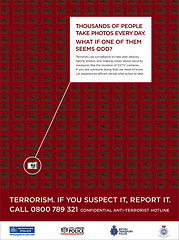
- Image by Project 404 via Flickr
In a previous post, we questioned the future after the recent terror incident. Then we asked when sanity would return. Now, we have to approach this from yet a different angle.
We’ve maintained consistently that the most effective anti-terrorist tool in intelligence. Good intelligence can stop a potential terror suspect before he gets anywhere near the airport. Beyond that, we have screenings. The New York Times reports that the U.S. Government’s response to a warning from the man’s father that he developed radical views, had disappeared and might have traveled to Yemen, was not to revoke the young man’s visa to enter the United States, which was good until June 2010. Now, on some level, that makes sense. But their response was to flag him for an investigation should he ever apply for another visa and to add him to a list of over half a million other individuals with possible terrorist connections.
The British government denied him a visa. That is another thing that should trigger a review. If another country denies someone the right to enter, and you have a tip, an investigation definitely should be launched.
What should we do when we receive a tip such as this? Such tips must come in every day, and are rarely fruitful, but must be investigated. But how do we realistically handle that?
We tend to find the simple way the Cranky Flier summed it up to convey the right sentiments. “How is it that while thousands of people have been incorrectly flagged, this jackass just walks right on the plane?”
That is the intelligence side of things. Let’s focus on the airport screening side of things. The TSA‘s immediate response was to amp up security on all flights inbound to the United States. As we’ve stated before, a potential terrorist seeing this might merely move his attack attempt to a domestic flight.
The TSA failed to communicate any of their response to the public, leaving the airlines, and a few people with copies of the security directives to do so. They seriously dropped the ball on that in an effort to not tip off the potential terrorists as to what they were doing. None of them monitor the Internet or the news, of course. The security directive has been relaxed, and is set to expire on December 30th…to be replaced by what?
We’ve been saying since the beginning that behavioral profiling should be a primary factor in airport screening. This individual had explosives in his underwear, how nervous would that make you look? Some TSA agents have been trained in such techniques. But TSA training is either woefully inadequate, or woefully inconsistent.
Perhaps it is actually inconsistent by design. The head of Homeland Security did say that these techniques can’t be disclosed to avoid giving potential terrorists a heads-up, and will be rotated. But what even does that mean? We want our TSA agents to be the way we like to think policemen are supposed to be, not like prison guards.
So, what about metal detectors, x-ray machines, body scanners? Well, certainly checking for weapons shouldn’t be stopped, but machines miss things all the time. Meanwhile, there is the TSA trying to not profile and making old ladies who can’t walk hobble through metal detectors in the name of security.
Ultimately, President Obama ordered a calm and measured response. He ordered a review of the country’s watchlist system and air safety regulations. “It’s absolutely critical that we learn from this incident and take the necessary measures to prevent future acts of terrorism.” This should become a regulation by itself. Any serious breach of security should automatically trigger a mandatory review, not only by the organizations responsible, but by someone independent. That could be a Presidential Commission, a Congressional Committee, or the U.S. Government Accountability Office. If they are concerned about the possibility that the information in such a report could aid terrorists, they can classify the results and issue a sanitized public summary.
The media on this seems unlikely to end for a while, and very little other aviation news will be noticed until this dies down. Either way, we’ll continue to keep an eye on it.
